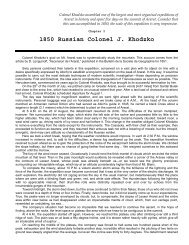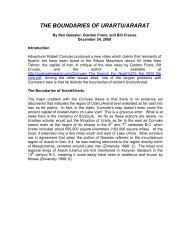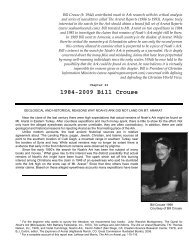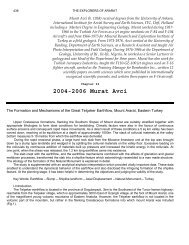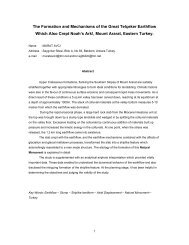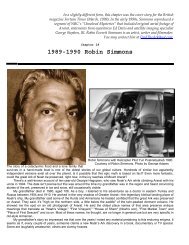1876 British Viscount & Ambassador James Bryce - Noah's Ark Search
1876 British Viscount & Ambassador James Bryce - Noah's Ark Search
1876 British Viscount & Ambassador James Bryce - Noah's Ark Search
Create successful ePaper yourself
Turn your PDF publications into a flip-book with our unique Google optimized e-Paper software.
136 THE EXPLORERS OF ARARAT<br />
It should be noted that Dr. Parrot (1829 on the summit), German Dr. Herman Abich (1845 on Western Slope) and<br />
Russian Colonel Khodzko (1850 on the summit) planted wooden crosses on the mountain earlier. Parrot's largest<br />
piece of wood was five feet long and two inches wide. Khodzko's cross of seven feet could have fallen or been moved<br />
down to lower elevations where <strong>Bryce</strong> found it.<br />
<strong>James</strong> <strong>Bryce</strong> (1838-1922), a well-respected professor of law at Oxford, was born in Belfast, Ireland. <strong>James</strong> <strong>Bryce</strong>,<br />
also a historian and statesman, was named <strong>Viscount</strong> and <strong>British</strong> <strong>Ambassador</strong> to the United States of America (1907-<br />
1913). He became a leader of the Liberal party, held several government posts, and was a popular ambassador to the<br />
United States. His treatise and study on the U.S. Constitution, The American Commonwealth (1888), remains a classic<br />
and is still used.<br />
At Trinity College, Oxford (B.A., 1862; doctor of civil law, 1870), <strong>Bryce</strong> wrote a prize essay that was published in<br />
book form as The Holy Roman Empire (1864). In 1867 he was called to the bar, and from 1870 to 1893 he served as<br />
regius professor of civil law at Oxford, where, with Lord Acton, he founded the English Historical Review (1885). From<br />
1880 to 1907 he was a Liberal member of the House of Commons, serving as undersecretary of state for foreign<br />
affairs (1886), chancellor of the duchy of Lancaster (1892), and president of the Board of Trade (1894-95). During<br />
those two years he also presided over what came to be called the <strong>Bryce</strong> Commission, which recommended the<br />
establishment of a ministry for education. At about this time he began to attack the expansionist <strong>British</strong> policy that led<br />
to the South African War (1899-1902). Thus, when Sir Henry Campbell-Bannerman, who had also opposed the war,<br />
became prime minister in December 1905, he appointed <strong>Bryce</strong> chief secretary for Ireland.<br />
<strong>Bryce</strong>, who had made the first of his several visits to the U.S. in 1870, was sent as ambassador to Washington,<br />
D.C., in February 1907. He already had made many friends in American political, educational, and literary circles and<br />
had become widely popular in the United States for The American Commonwealth, 3 vol. (1888), in which he<br />
expressed admiration for the American people and their government. As ambassador he dealt principally with U.S.-<br />
Canadian relations, which he greatly improved, in part by personal consultation with the Canadian governor general<br />
and ministers. In the process he also bettered relations between Great Britain and Canada, securing Canadian<br />
acceptance of an arbitration convention (April 4, 1908) originally signed by Great Britain and the United States. He<br />
retired as ambassador in April 1913.<br />
On Jan. 1, 1914, <strong>Bryce</strong> was created a viscount. In the same year he became a member of the International Court<br />
of Justice, The Hague. Later, during World War I, he headed a committee that judged Germany guilty of atrocities in<br />
Belgium and France. Subsequently, he advocated the establishment of the League of Nations.<br />
In <strong>1876</strong>, <strong>James</strong> <strong>Bryce</strong> went on a steamboat from St. Petersburg 900 miles down the Volga River system to<br />
Saratof where he took a Russian train 1100 miles to the foot of the Caucasus Mountains, 126 miles via wagon toward<br />
Tiflis, and then on to Erivan, Aralykh, and up the southeast side of Ararat to summit it alone as all his companions fell<br />
by the wayside to exhaustion. While Dr. Friedrich Parrot was a Russian who spoke and taught also in German, <strong>James</strong><br />
<strong>Bryce</strong> was an Englishman who began his journey from Russia. After his expedition, <strong>James</strong> <strong>Bryce</strong> authored the classic<br />
work, Transcaucasia and Ararat, and has a descriptive form a writing that only educated ninenteenth century authors<br />
can attain. If the reader does not enjoy history or would rather skip the wonderful reading on the voyage getting to<br />
Mount Ararat from St. Petersburg, then the reader may want to skip a few pages and go directly to Chapter V or VI<br />
below.<br />
Introduction<br />
The following pages contain a record of impressions received during a journey in the autumn of <strong>1876</strong> through<br />
Russia, the Caucasian countries, and the [Ottoman] Turkish Empire. They are first impressions only, for which no<br />
value can be claimed except that which belongs to impressions formed on the spot, and (as the author trusts) without a<br />
prejudice in favor of either of the states which are now contending in the regions here described. Yet even first<br />
impressions, if honestly formed, may sometimes atone for their crudity by their freshness. What most readers desire to<br />
know about a country is how it strikes a newcomer. A book that tries to give this, to present the general effect, so to<br />
speak, of the landscape, may have its function, even though it cannot satisfy the scientific student of geography or<br />
politics.<br />
The Author, however, did not travel with the intention of writing a book, nor would he, sensible as he is of his<br />
imperfect knowledge, have now thought of sending these notes to the press but for two reasons. One is the<br />
unexpected importance, which the outbreak of war in the countries he visited has given to them. The other is the<br />
urgency of his friends, whose curiosity regarding Mount Ararat has made him think it worth while to print a narrative of<br />
what he saw, and who assure him that some account of a mountain which every one has heard of, but about which<br />
comparatively little has been written, would be more interesting to English and American readers than he had at first<br />
supposed.



